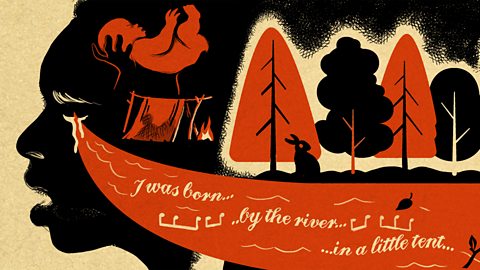Six hopeful songs that have helped people through adversity
By its very nature, "soul music" inspires feelings of hope, redemption, struggle against oppression, and most important of all, empathy with the listener. Here are 6 songs that have featured in Soul Music that have motivated communities and connected individuals – songs we can truly class as inspirational anthems.

Sam Cooke – A Change Is Gonna Come
One of the most poignant songs of the civil rights era, Sam Cooke’s A Change Is Gonna Come was written as a reaction to his own experiences of racial bigotry in the deep south of the United States during the early 1960s. Rumoured to have been inspired by an incident at a whites-only motel where he and his band were refused entry, particular words in the song refer to the underlying threat the African-American community in the southern states acutely felt at the time – “I go to the movie and I go downtown, somebody keep telling me don't hang around“.
Although this lyric in particular spoke for those suffering racial injustice during this turbulent period, it was changed by Bettye LaVette when she performed the song on the steps of The Lincoln Memorial before Barack Obama’s inauguration in 2009 to “I used to try to go to the movies, and I’d try to go downtown, but somebody was always telling me, little girl, you can’t come around” in order to reflect her own experience of the time.
“I was the only person on the show who was born in segregation” she says when she speaks about it on Soul Music. Her rendition of the song is a profoundly moving experience within this context. The fact that the U.S. was about to inaugurate its first ever African American president was a pivotal moment in the long struggle for civil rights, and this inspired her to alter the song's main refrain from “a change is gonna come” to “I know a change has come”.
The song has gone on to be embraced by all those facing adversity, and as such has been covered by a myriad of artists including Patti Labelle, Aretha Franklin, and Beyoncé in order to highlight not just racism, but other important injustices within society such as the inequality of the sexes, and as a song of hope for the future.

Why Sam Cooke's 'A Change Is Gonna Come' became a Civil Rights anthem
Professor Mary King describes how the 1964 record became a symbol of hope.
Bob Marley – Redemption Song
When it comes to the human spirit triumphing over adversity, there are few who haven’t been moved by Bob Marley’s compelling Redemption Song, the last song he recorded on his final album, Uprising, before his death from cancer in 1981. With its simple acoustic backing and metaphysical message of hope – lent gravity by the sure knowledge of his own impending death – it has inspired generations of individuals and communities who have been affected by the ongoing struggles of life, and given them hope of future emancipation.
These lyrics... give us the motivation to go forward and not to be afraid of life, but to love life.
Musicians Without Borders' representative Ahmed al Azzeh is one such person. Living in cramped conditions in a camp in Palestine, he says in this episode of Soul Music, “without music I don’t think I would have survived”. He explains what Redemption Song in particular means to his community when they listen to it each night around a fire, on the roof of one of the small buildings located at the edge of the camp. Singing the words that Bob Marley himself lifted from a Martin Luther King speech – “none but ourselves can free our minds” – unites them in hope.“ These kind of lyrics would give us all the motivation to go forward and not to be afraid of life, but to love life."
American singer-songwriter John Legend takes a different kind of inspiration from the song – its redemptive quality. For him of prime importance is “the idea of grace, of redemption, of giving people second chances”, especially when it relates to the criminal justice system in the U.S. where so many people are locked up, especially those from the African American communities. He has championed the song in his fight to raise awareness of mental health issues and other extenuating circumstances associated with incarceration, and played a piano version of it when he spoke at the TED conference in February 2016 on imprisonment and America’s criminal justice system.
Amy Winehouse – Back To Black
Amy Winehouse’s smoky, raw, emotional Back To Black has been inspirational in a wholly different way, despite the innate tragedies associated with both the song’s content, and the singer’s own problems and untimely death. Amy said in an interview with the Sun newspaper in October 2006 that the song was about ending a relationship and returning to “drinking and dark times”, but the song still has a positive resonance, especially with younger women.
In this episode of Soul Music writer Daisy Buchanan explains how the track “allowed me to make sense of my own doomed, difficult feelings when I found myself in love with a person who didn’t love me back” and that Amy’s lyrics, especially the words “and my tears dry, get on without my guy” felt as if they were being sung directly to her.
It is the song’s uniquely emotive power which gives it this ability to connect on a personal level with young women like herself, but also, how Amy conveys what it feels like to be utterly alone that ironically, provides its most potent universal impact. As the American novelist and essayist Leslie Jamison points out “That feeling that you are are alone even when you’re in the company of others was also something that Amy Winehouse had a way of speaking to, that kind of vulnerability and precision that resonated really deeply with me and resonated with a lot of people... even inside a life that looks pretty good from the outside, you can just feel impossibly alone.”
Read more about the impact Back to Black had on Daisy Buchanan

Sister Sledge – We Are Family
This classic disco song has been a rousing anthem for families of all kinds since its release in 1979, but it became something more than that to author and blogger Lisa Bain of Boise, Idaho, when her husband tragically died of cancer in 2016.
She talks candidly in this episode of Soul Music about her estrangement from close friends whose sympathy gradually dwindled away as she was expected to "move on" rather than "move forward" at a time when she was still dealing with the acute grief of her husband’s passing. She began a blog in order to verbalise these difficult and painful feelings, and through the blog she was able to connect with other widows dealing with similar feelings of loss, and this bond of widow sisterhood became a new family to her, one where she felt immediate empathy and understanding – “we become this tribe of warrior sisters who are making it one day at a time... we find each other and we have this shared bond”. And through this whole period, music became the soundtrack to these feelings “because music became almost another language for me... it was very natural to incorporate that in to the blog posts". We Are Family in particular, has special significance in that it “is the perfect analogy of what our sisterhood is like”.
“That song wrapped it up beautifully....being with other widows doesn’t have to be sad it can be a beautiful, beautiful happy thing”.

The Pine Ridge Boys – You Are My Sunshine
This country song was first recorded by The Pine Ridge Boys (Jimmie Davis and Charles Mitchell) in 1939 but has become so well known since then – having been sung and recorded by over 400 artists – that it has become embedded in popular culture.
This simple song, so loved by children, was easy to recite, but both poignant and uplifting in equal measure, which is why it was chosen by the teachers of a day care centre in Moore, Oklahoma to sing to the children in their care when they knew tragedy was about to strike.
Moore is located in Tornado Alley and on that fateful day in May 2013, a huge tornado had formed, earlier in the day than people believed was usual (at the time people wrongly believed storms like this only hit in the evening), and began bearing down upon the town while the day care centre was still full with children. There was no storm shelter in the building, and no time to evacuate. In this episode of Soul Music, writer Holly Bailey, who grew up in Moore, describes the tornado which began life as a “flimsy little cloud... and then suddenly it turned into this massive tornado that became almost a mile wide with winds that were over 200 miles an hour”. She adds how terrifying the sound and fury of a massive tornado like this is, and how it can rumble like a huge freight train as it approaches.
The day care centre was in its direct path, so the teachers began to sing You Are My Sunshine with their small community of children to try and allay their fears and stay upbeat, repeating it over and over until the storm hit – like a mantra to ward off evil. Miraculously, everyone in the day care centre survived, despite the building itself being demolished and the town devastated, but tragically the tornado claimed 25 lives across the rest of the community.
Labi Siffre – (Something Inside) So Strong
Music is a powerful tool for uniting communities, even those supposedly dispossessed by society. In this episode of Soul Music we get to hear Birmingham’s Choir With No Name, the majority of whose members are either homeless, or have been affected by issues relating to homelessness. Labi Siffre’s politically motivated Something Inside So Strong has become a focal point in their performances. Originally inspired by oppression in South Africa during the Apartheid era as well as Siffre’s own persecution growing up as a homosexual, Pete Churchill, the musical director of the choir explains why the song has such resonance to the choir’s members who have all struggled through extremely difficult times themselves living on the fringes of society.
They’re singing about the strength of the human spirit, and not being defeated.
“And then they come together and they’re singing about the strength of the human spirit, and not being defeated, and carrying on, and having pride... it just makes it more powerful, and often we have people in tears after Something Inside So Strong”. Choir member Bill West recounts the tragic events that lead to his descent into depression and homelessness, and the ongoing battle he faces to overcome his situation. Around him in the choir are people who have had to deal with similar problems of bereavement, lack of self worth, mental health issues, and the physical reality of being on the streets. According to Bill, singing this song is like “your souls are all coming alive again, defiantly screaming out, you are not gonna beat us.”




